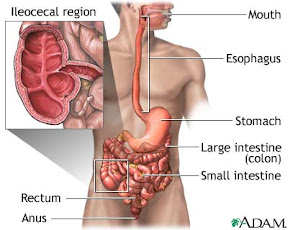Wednesday, 9 November 2011
Can worm eggs cure Chrons?
They're called "pigwhip worms" to be precise and the participants of the trial will swallow the eggs of these little guys and let them hatch inside says Dr. Ira Shafran who is one of three physicians in the U.S. who will be taking part in this study.
Dr. Shafran went on to say that "The little larvae come out and they make a contact with your intestinal lining that actually turns on an immune response," It is then believed that the worms will actually lessen that immune response and could greatly reduce gastrointestinal issues associated with the disease.
Whilst they are considered parasites to pigs, Dr. Shafran says these worms are harmless to humans and have not shown any side effects in other studies.
In fact, some scientists believe the eradication of worms from human stomachs over the past 50 years may be behind the rise in these conditions. As the number of infections by parasites, such as roundworms and human whipworms, has fallen, the number of people being diagnosed with inflammatory bowel disease has increased.
"This is not an invasive worm," he says. "It's not toxic to the GI tract and it doesn't cause human disease."
"If we can extract something from earth or nature and harness that naturally occurring species at a lower cost to patients without any safety issues and without altering the immune system, that's a huge development," says Dr. Shafran.
The tests are due to start sometime in November, with the findings due to be announced at a conference in the United States in May.
Saturday, 21 February 2009
Children with Chrons Disease & Folic Acid Link
 It has been found that Children with inflammatory bowel disease (IBD), that includes children with chrons and ulcerative colitis have low levels of Folic Acid in their blood, this ads to the theory that people with chrons and ulcerative colitis are lacking in Folate (Folic Acid)
It has been found that Children with inflammatory bowel disease (IBD), that includes children with chrons and ulcerative colitis have low levels of Folic Acid in their blood, this ads to the theory that people with chrons and ulcerative colitis are lacking in Folate (Folic Acid)
What is Folic Acid?
Folic acid which is also called Folate, Vitamin B9 or Folacin are the types of the water-soluble Vitamin B9. The names of Folate and Folic acid come from the Latin word folium which means leaf.
Why is Folic Acid important?
Vitamin B9 that is essential to numerous bodily functions. It is vitally important during periods of rapid cell division and growth, this includes childhood and when a person is pregnant. Both children and adults require folic acid to produce healthy red blood cells and prevent anemia.
Researchers from the University of California in San Francisco believe that IBD in children may be different from the IBD that affects adults. This discovery was made when they measured blood folate levels in 78 children, nearly half of whom had recently been diagnosed with IBD while the remainder were healthy controls. Folate levels were nearly 20 per cent higher in the IBD group, the researchers found, even though the controls were ingesting around 18 per cent more folate from their diet.
Folic Acid in Foods
Folate is found in leafy vegetables, so things like spinach, turnip greens, lettuces, dried beans and peas, fortified cereal products, sunflower seeds and certain other fruits and vegetables are rich sources of folate. Liver and liver products also contain high amounts of folate, as does baker's yeast. Some breakfast cereals (ready-to-eat and others) are fortified with 25% to 100% of the recommended dietary allowance (RDA) for folic acid.
Folic acid is added to grain products in many countries, and in these countries fortified products make up a significant source of folate.
Sources: American Journal of Clinical Nutrition, 2009; 89: 545-50 & Wikipedia.
Wednesday, 10 October 2007
Immune deficiency the likely cause of Ulcerative Colitis
Experiments being carried out on mice in the US at the Harvard School of Public Health have identified an immune deficiency as the most likely cause of ulcerative colitis. Ulcerative colitis is a severe inflammatory disease of the colon and is similar to Chrons Disease. For the differences between Chrons Disease and Ulcerative colitis, take a look at my post on Is Chrons disease different to ulcerative colitis?
The research also showed that once mice had the disease, it could then be passed from mother to their offspring and even between adult animals. They also linked ulcerative colitis in mice to a deficiency of a molecule in the immune system, which would normally prevent harmful bacteria in the large intestine from breaking the bowel's protective lining and thus allow the damaging inflammation. A shortage of a protein called T-bet which usually regulates the harmful bacteria. This then allows the bacterial attack on the intestinal wall. This then causes the inflammation we know as ulcerative colitis that's identified by the open sores throughout the colon.
The details of this study is posted online in the journal Cell. www.cell.com
It is hoped that better understanding of Ulcerative Colitis will also lead to a better understanding of Chrons Disease and one day a possible cure.
at
01:29
1 comments
![]()
Labels: Ulcerative Colitis
Thursday, 27 September 2007
Is Chrons disease different to ulcerative colitis?

In one word, yes. Chrons disease is different to ulcerative colitis although they are quite similar and a incorrect diagnosis can often be given.
In what ways is Chrons Disease different to ulcerative colitis?
Crohn's disease usually causes inflammation in your rectum, colon, small intestine and sometines even in your stomach, mouth and esophagus.
Ulcerative colitis causes an inflammation only in the colon (which is called the colitis) and or the rectum.
The inflammation in Chrons disease is also different from ulcerative colitis because except in the very worst examples, the inflammation of ulcerative colitis only seems to affect the superficial layers of the inner lining of the bowel.
The inflammation of Chrons disease tends to be concentrated in some areas more than others and affects layers of the bowel that are deeper than the superficial inner layers. Therefore, the affected areas of the bowel in Chrons disease often has deeper ulcers with normal lining between these ulcers.
Find books on Chrons Disease in the UK, USA, Australia and Canada on Abebooks.com
at
02:18
1 comments
![]()
Labels: About Chrons Disease, Ulcerative Colitis
